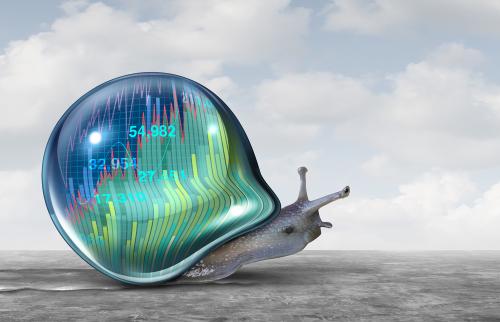Editor’s Note: In collaboration with the Financial Times (FT), Eswar Prasad and Karim Foda of Brookings have developed a set of composite indexes which track the global economic recovery. The Financial Times has produced the Tracking Indexes for the Global Economic Recovery (TIGER) interactive map, which appears on the FT Web site.
Is the global economic recovery on track or are we in a lull before the next phase of the storm? This question dominates the news headlines and the current debate on the state of the global economy. But before we know where we are going, we need to know where the world economy now stands. This new index from the Brookings Institution and the Financial Times aims to track the recovery based on a set of macroeconomic, financial and confidence variables for the G-20 economies.
The interactive map below displays how fast individual G-20 economies are recovering and weathering the storm. Underneath the map, links to key indicators display how fast those indicators are recovering for advanced economies, emerging markets and a composite total.
Economic Recovery in the World’s Advanced and Emerging Market Economies
Click to view the interactive map »
Click on an individual country in the map to view charts for the main TIGER indexes for that country and charts for the indicators that make up the indexes, which are broken down by real economy, financial and confidence indicators.
As well as tracking country performance, the TIGER indexes also track the performance of key indicators across groups of advanced economies, emerging markets and a composite total. Click on the following links to view the charts for the following key indicators:
| Real Economy Indexes |
Financial Indexes |
Confidence Indexes |
For detailed information on the composition and construction of the indexes and a comprehensive description of the data and source information, please refer to the technical appendix.
These indexes reveal four dominant themes:
- While global economy turned the corner by mid-2009, there is still a long way to go before the recovery is entrenched and on track toward robust growth. Industrial production and trade volumes, in particular, have recovered strongly while the recovery in GDP and employment has been more modest.
- Emerging markets felt the effects of the global crisis later than the advanced economies, experienced milder slowdowns, and have also recovered more sharply.
- Since mid-2009, the recovery in world financial markets has outpaced that in key macro variables. In the last two months, financial market performance has leveled off, suggesting greater uncertainty about the recovery and possibly presaging a period of weak growth.
- Confidence measures have regained much of the ground they lost during the worst of the crisis. Business confidence has continued to increase gradually while consumer confidence has been stuck in a rut in recent months.
Highlights for Q1 2010:
- The global economic recovery continues to gather momentum but has hit some rough patches in 2010.
- Financial market performance has cooled off in recent months. The debt crisis in Europe has clearly rattled financial markets. This could signal prescience of financial markets about more difficult times ahead or just a temporary pullback from an earlier surge of unfounded optimism. Either way, this is not good for the recovery.
- Employment growth in the advanced economies was very weak until the beginning of 2010, when it started showing some signs of life.
- In both advanced and emerging economies, business confidence is still rising gradually while consumer confidence in advanced economies has been stuck in a rut in recent months. Resurgent business confidence is a positive sign as it could boost investment. But weak consumer confidence and minimal employment growth could dampen the recovery if they translate into tepid growth in private consumption.
- Emerging markets are barreling their way to a strong performance despite the problems that have beset advanced economies. Perhaps, in a long-term structural sense, they are becoming less dependent on advanced economies. But emerging markets cannot pull the world economy along by themselves. Continued weakness in the advanced economies could mean we are in for a long and hard slog toward a durable global economic recovery.
Read the related commentary: “The World Economy is Recovering“ »




